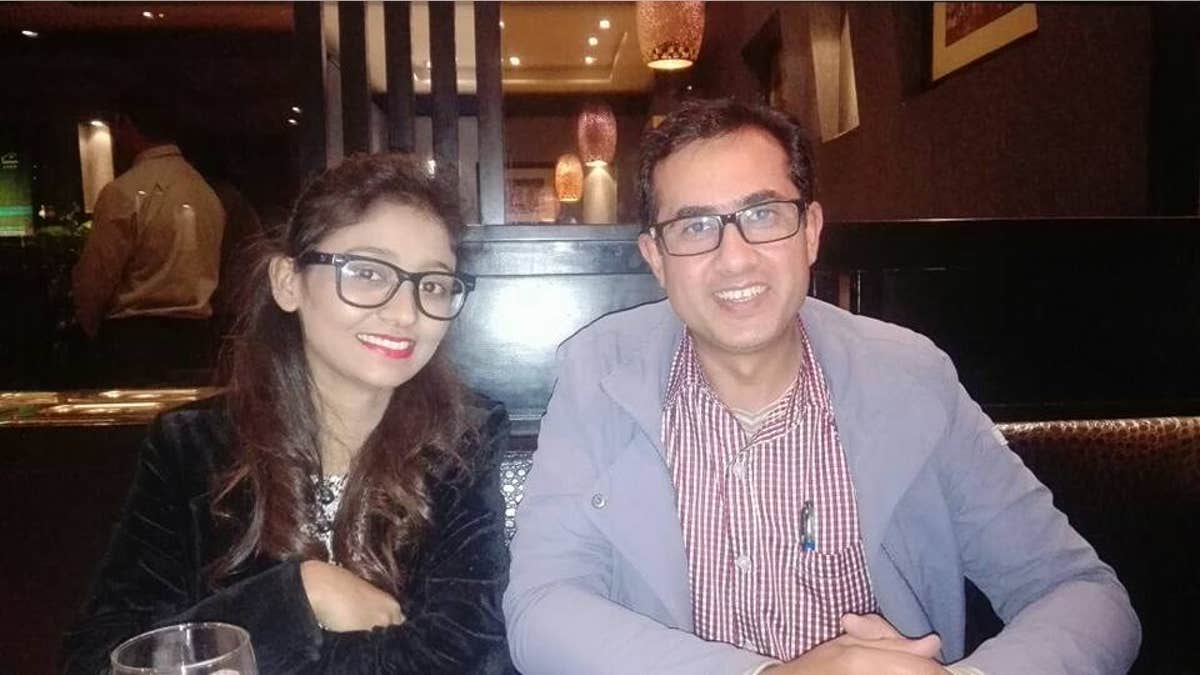Jew born in Pakistan first in decades to be allowed to declare his faith
{{#rendered}} {{/rendered}}
Fischel Benkhald (right) in Pakistan with BPCA officer Ambar Saroya.
For the first time in decades, Pakistan has allowed one of its 185 million citizens to register officially as a Jew. For Fischel Benkhald, achieving this milestone has taken years and required the efforts of people in two countries.
Fischel -- his chosen Yiddish name -- was born Faisal Benkhald in the Pakistani city of Karachi to a Jewish mother and Muslim father, the fourth of five children. He grew up reciting blessings over Shabbat candles, cooking the unleavened bread known as challah every Friday and watching his mother prepare kosher dishes. Unlike his siblings, Benkhald felt a strong pull to his Jewish ancestry.
After the death of his parents while he was a teen, Benkhald was raised by his strictly Muslim uncle. But two years ago, the 29-year-old embarked on the bold road of officially changing his religious status from Muslim to Jew with the National Database and Registration Authority (NADRA). Pakistan requires the ID cards of its citizens to specifiy his or her religion.
{{#rendered}} {{/rendered}}The application was seemingly denied in November 2015, but soon Wilson Chowdhry, chairman of the British Pakistani Christian Association, learned of Benkhald’s efforts and took on the case.
“We found there was a huge reluctance to alter his passport and ID card via NADRA officials,” Chowdhry told Fox News. “Our initial inquiry led to very little progress by way of the fact they simply chose not to respond.”
Chowdhry -- who says he is banned from the country for being “anti-Pakistan” -- subsequently raised Benkhald’s case during sessions helmed by Britain’s Parliament and the All Parliamentary Party Group for International Religious Freedom. In January, the matter was brought to the attention of the first minister at the Pakistani High Commission in London and then to Pakistan’s Interior Ministry.
{{#rendered}} {{/rendered}}On Tuesday, after three years of frustration, Benkhald got word that his ID card, which he has yet to actually receive, was approved.
“It feels like shackles have been removed from me and I feel a great sense of liberty now,” he said.
While Pakistan now has only one citizen who has registered as a Jew, there are said to be hundreds of Jews living anonymously in the country.
{{#rendered}} {{/rendered}}“Other Jews have simply stated they are Jews on a census,” Chowdhry explained. “None of them have their Jewish faith prescribed on an ID card or passport. This is very unique to Fischel. The obtaining of NADRA registration as a Jew is groundbreaking.”
Pakistan’s national identity card is required for such endeavors as voting, purchasing plane and train tickets, opening electricity and gas accounts, applying for college, buying phones and SIM cards and obtaining a driver’s license and passport. It not only requires the applicant to submit his or her name, date of birth, thumbprint and a photo -- it also records the person’s religion.
But declaring one’s non-Islamic faith in predominantly Muslim Pakistan doesn’t come without some serious risks. A 2010 survey by the Pew Global Attitudes Project concluded that 76 percent of Pakistanis polled advocate the death penalty for those who leave Islam.
{{#rendered}} {{/rendered}}Fischel, however, is not regarded as an apostate since, he says, he never converted to Islam and was always a Jew, praying with his mother, not his father.
“Of course we are concerned about the safety of Fischel. However, he has chosen to speak out and be heard,” Chowdhry noted. “Hopefully his brave decision to alter his faith will convince other Jews to come out of hiding.”
At the turn of the 20th century, it was believed that more than 1,000 openly Jewish people lived in Pakistan. However, the majority of Jews, located in Karachi, began moving to India and Israel in 1948 as violence toward them escalated in response to Israel’s war for independence. By the 1980s there were no known Pakistanis registered as Jewish on their passports, Chowdhry said.
{{#rendered}} {{/rendered}}US PRESSED TO HOLD PAKISTAN RESPONSBILE FOR RISING RELIGIOUS PERSECUTION
Over time, the country’s remaining Jews changed their names to Muslim ones for protection from persecution. Some have continued to practice in secrecy, while others abandoned their Jewish faith.
Muslims make up more than 95 percent of Pakistan’s population. Christians comprise around 2 percent, while Hindus and those categorized as “other” constitute the rest. Religious persecution remains a massive problem in the country. The United States Commission on International Religious Freedom last year said Pakistan should be designated a “country of particular concern” under the International Religious Freedom Act. The commission cited “systematic, ongoing and egregious” attacks on minority communities, discriminatory content in provincial textbooks and forced conversions to Islam.
{{#rendered}} {{/rendered}}INDIAN MUSLIM CLERICS GO MISSING IN PAKISTAN
But on the heels of his long-fought registration victory, Benkhald is hopeful that steady progress is being made.
“I hope the current government will be more inclined to preserve this important part of Pakistan’s history,” he added.
{{#rendered}} {{/rendered}}Pakistan’s Foreign Ministry did not respond to a request for comment.
